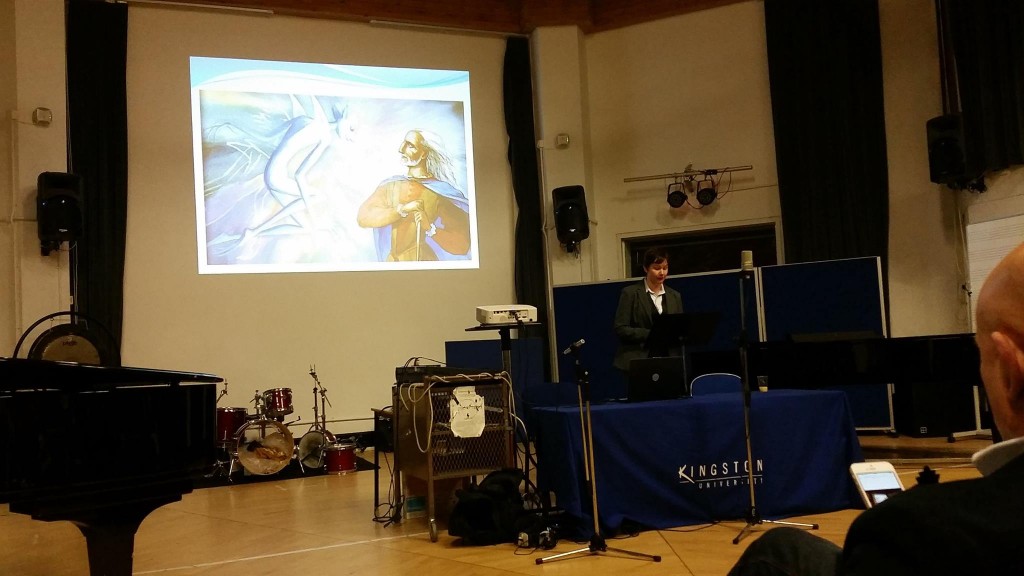Where there’s a Will…
On Thursday evening of this week, if I do say so myself, I did something rather brave. Here I am, shy little Brahmsian that I am (ok, well, not that shy, but still)… and I stood up in public, and talked about Shakespeare.
This might not seem like an earth-shattering happening. But it made me very aware of three things. So this week’s blog post is pretty much going to consist of my sharing the three things, and then giving you the link to the paper that I gave. All thoughts, as ever, gratefully appreciated.
1. It’s never too late to learn the back story. Maybe you should have a little more context first. The presentation I gave, rather ambitiously entitled ‘The radical gap between words and action’: Singing Shakespeare was part of this term’s Kingston Shakespeare Seminars, run by Prof. Richard Wilson at Kingston University. Each term, the KiSS series takes a different topic on which papers are then presented – law, architecture, history, and so on – and this term, it is the turn of music (you can see the rest of the series here). As part of Thursday evening, I was asked to organise a performance as well as a talk, and was fortunate enough to secure the services of a fine group of performers from the Royal College of Music, as well as the assistance of composer and pianist Michael L Roberts. Since the performance was to follow the talk – to give the audience a chance to hear some of the pieces previously discussed, and consider the points I’d made in context – I asked the singers and pianists if they would mind sitting in on the talk before they went on. They agreed… and afterwards, were among the first to come bounding up to me to give me their feedback. In general the message was that they’d enjoyed it (which was gratifying) – but more than this, that they had learned something from it. In some cases, it had given them new perspectives on characters whose back story they had previously not known. When singers are asked to perform endless settings of Mignon’s songs, in the midst of busy schedules, it is a hard task to find the time to go off and read Goethe’s novel (which, let’s face it, is not exactly short). And the same goes for Ariel’s songs in The Tempest. They had heard a little back story now, a little more about the reason that they – and the characters in question – were singing in the first place. It’s never too late to learn.
2. You never know how differently your discipline constructs things from any other until you start talking about it. However carefully we try to pay attention to a broad range of perspectives on a subject, by and large our thinking is going to be conditioned by our environment. That environment is not as simple as ‘conservatoire’, ‘university’, ‘performance venue’, and so on – it is also about the perspective you have on your subject. Being in a room with film directors, literary scholars, muscians whose expertise lies in very different areas from my own, and the general public, was an enormous thrill. The researchers from other subjects spoke to me afterwards about the unusual approach I had taken (although it didn’t seem very unusual to me), and raised questions I wouldn’t even have thought about asking. They made me aware, of course, of the vastness of the subject matter at hand – how on earth do you even begin to contain ‘Shakespeare and music’? – but they also gave me new ways of looking at my material. This is the joy of working in an interdisciplinary environment. It requires a leap of faith, of the risk of speaking out in a roomfull of those who may know far more than you… but then, you probably know far more than they do about certain things, too. It’s like spending three months in a room, puzzling at the shape of the windows, and someone else turning up and pointing out the doors on the opposite wall that you hadn’t even noticed were there. It’s exciting.
3. Brahms’s First Symphony wasn’t finished until he was forty-one – and now I understand why. Okay, this might seem like a bit of a curveball. But I promise it’s relevant. Brahms had a difficulty in bringing his First Symphony to fruition, because the pressure he felt to produce something worthy of the name, and of his name, and the symphonic tradition, was immense. He took time, and looked in other directions first (choral pieces, concertos, the serenades) to judge the lay of the land. In the same way, I’ve been sitting on this research for about a decade, a seed planted during my MA research of which I’d always been rather fond, but could never quite face publishing. The invitation to speak at Kingston was a great opportunity, and gave me the chance to revisit and refine those thoughts that had been bubbling away over the years. Who knows? Maybe it will make it into a published format soon… in the meantime, you can find a text version of the paper here, on my academia.edu page. A podcast of the presentation is available here, and will also be made accessible as part of the London Graduate School series.
I suppose in sum, all I’m really trying to say is: it never stops being a little bit scary, stepping outside of your comfort zone – whether you’re speaking to experts in a discipline that isn’t your own, attending your first classical concert, making that first visit to a football match, stumbling over the ice in your hired skates at the Christmas fare… But it’s worth it. It’s exciting! And you never know what you might learn.

